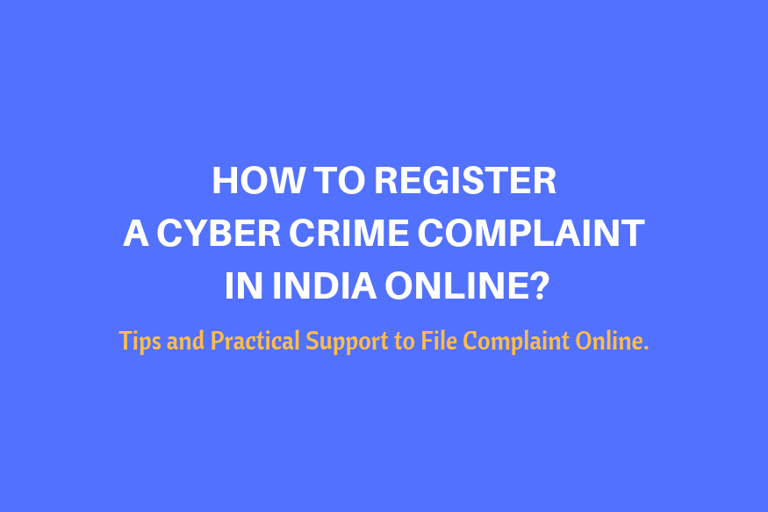How to Register a Cyber Crime Complaint in India
TOP STORIESLAW AND RIGHTS


Learn how to file a cybercrime complaint in India with the correct steps and tips. Protect your digital identity and ensure timely legal action.
Cybercrimes have become increasingly prevalent in India, and understanding how to report them is crucial. With the advent of the Bharatiya Nyaya Sanhita (BNS) Act, 2025, certain offenses related to cybercrime have been updated, replacing older provisions under the Indian Penal Code (IPC). Here's how you can file a cybercrime complaint, along with an explanation of key terms for better understanding.
Key Types of Cyber Crimes:
Phishing: This involves tricking people into revealing sensitive information, like passwords or bank details, often through fake websites or emails.
Spoofing: When a cybercriminal impersonates a trusted entity (like a bank) to deceive the victim.
Denial of Service (DoS) Attack: This is when a website or online service is overwhelmed with traffic, making it unavailable to users.
Credit Card Fraud: When someone uses your credit card details without your permission for illegal transactions.
Cyber Defamation: Using the internet to spread false or damaging information about a person.
Child Pornography: The creation, distribution, or possession of explicit material involving minors.
Steps to File a Cyber Crime Complaint:
Preserve Evidence:
Do not delete any suspicious emails, messages, or files. Keeping the original evidence intact is important for investigation.
Screenshot or record videos of any suspicious activity or messages you receive.
Contact Local Cyber Crime Cell:
Each state in India has a Cyber Crime Cell that handles complaints related to cyber offenses. You can visit their office or file an online complaint.
The Cyber Crime Cells were set up after the enactment of the IT Act, 2000 (now updated by the BNS Act), to handle such offenses with specialized knowledge and tools.
Submit a Written Complaint:
Write a clear and concise complaint with all the facts about the incident, such as what happened, when, and how.
Submit it to the Cyber Crime Cell either in person or by sending it through post or private courier. Make sure to keep a receipt for tracking purposes.
Follow Up:
After filing the complaint, you may need to wait for the authorities to respond. If you don’t get a response within 10 days, you can file an RTI (Right to Information) request to ask about the status of your complaint.
If the complaint is urgent or involves sensitive material (like blackmail or pornography), you can seek assistance from NGOs or file it anonymously online.
Important Laws in Cyber Crime Cases:
Section 66C of the BNS Act: Deals with identity theft. If someone illegally uses your personal information, they can be punished under this law.
Section 66D of the BNS Act: Addresses fraud using computer resources, such as when a person impersonates someone else online to steal money.
Section 67 of the BNS Act: Covers the distribution of obscene content online, including child pornography or other explicit material.
What Happens After Filing a Complaint?
Once the Cyber Crime Cell receives your complaint, they will investigate the issue. This could involve checking your computer, mobile phone, or even the server that was compromised. They may also track the IP address of the person responsible to locate and apprehend them.
Conclusion:
Cybercrimes are serious offenses, and understanding how to report them is essential for the protection of your rights. The BNS Act (2025) has made significant strides in improving the legal framework for handling such cases. If you believe you’ve been a victim, do not hesitate to report the crime to the Cyber Crime Cell. Always remember, cybercrimes should never be ignored, and legal assistance is available through government bodies and NGOs to help you get justice.
If you're unsure about how to proceed, or if the matter is more serious (like blackmail or online harassment), consulting an advocate or seeking free legal aid could help ensure your case is handled effectively.
Become Member of NGO and Get Support
If you're a victim of cybercrime or any other human rights violation, you don’t have to navigate the complexities of the legal system alone. At Jivanamasteya Trust, we offer comprehensive support through our Human Rights Membership, ensuring victims receive the legal assistance, advocacy, and guidance they need. Our Project Karnav is designed to help you understand your rights, navigate legal challenges, and empower you with the knowledge and resources necessary to take action.
Become a member today and get immediate access to critical support, counseling, and legal services. Learn more about our programs and apply for membership here:
Learn more about Project Karnav
Join the Human Rights Membership
Take the first step toward justice with Jivanamasteya Trust.
Key Takeaways:
Understand Cybercrime: Cybercrime includes activities like hacking, fraud, and online harassment, often targeting individuals and organizations.
Legal Protections: The Information Technology Act, 2000, offers legal frameworks for addressing cybercrimes in India.
Steps for Victims: Victims should not alter evidence, document the incident, and file a police complaint promptly.
NGO Support: Jivanamasteya Trust offers membership to provide victims with legal guidance, support, and resources for their cases.
Learn more and become a member: Jivanamasteya Membership


Dr. Karnav Shah, Executive Director of Jivanamasteya Trust, is a committed child & human rights advocate leading initiatives in legal aid, livelihoods, & healthcare education in India & Australia. With a doctorate & degrees in law, business, & Mgt., he empowers communities through education, writing, & social action—igniting change & inspiring transformation through purposeful leadership.


